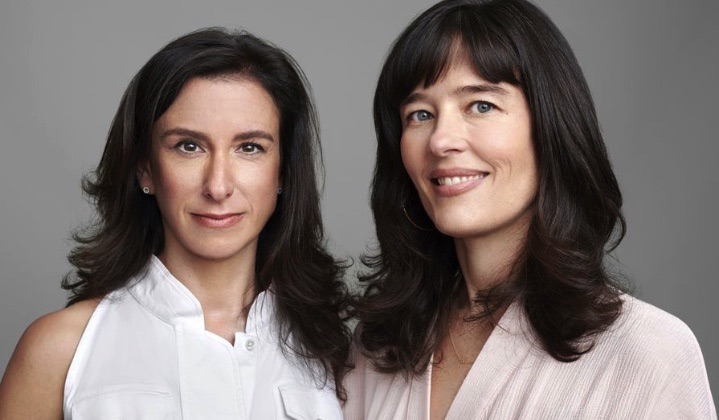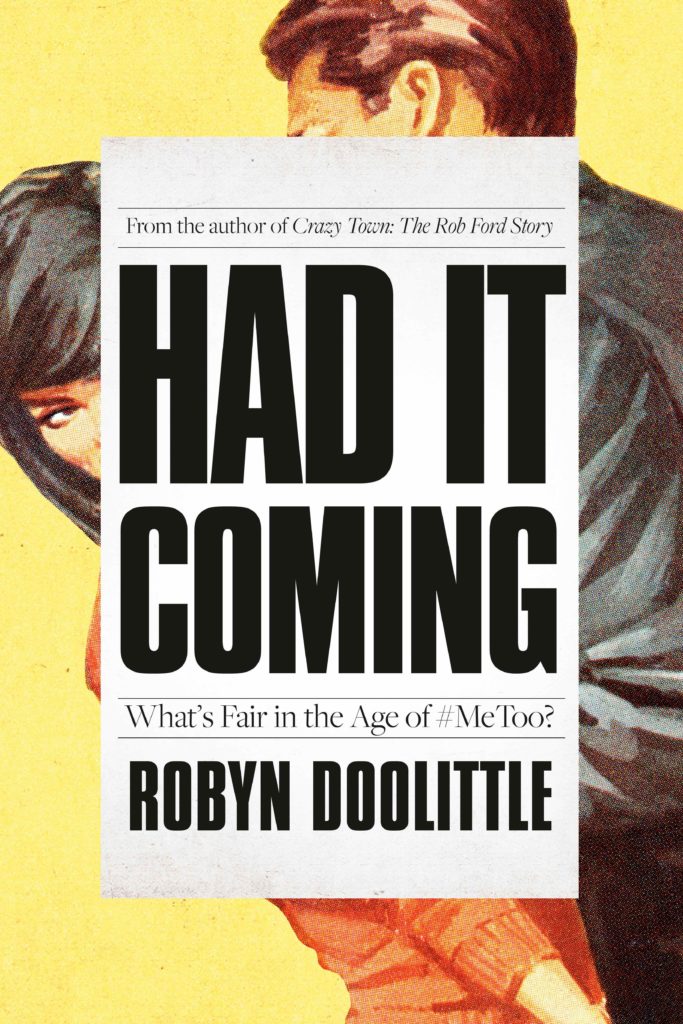There still remains substantial debate over “what behaviour crosses the line”
By Katherine Verhagen Rodis (November 22, 2019)
Had It Coming: What’s Fair in the Age of #MeToo? by Robyn Doolittle, Allen Lane, September 24, 2019, 304 pp, $19.17
In the wake of the #MeToo movement that caught fire in social media in 2017, Globe and Mail reporter Robyn Doolittle ended her 20-month investigation into how Canadian police handle sexual assault cases. Her conclusion was that a significant number of them had been mishandled, with many key investigative steps skipped, such as interviewing witnesses or testing forensic evidence, due to officers’ pervasive bias that most of them were baseless or “unfounded.”
Several cultural biases prohibit women, primarily, from being taken seriously in cases of sexual assault allegations. Reaching as far back as 15th Century witch trials and early 17th Century English law, Had It Coming reveals deeply engrained Western ideas that women are “always being deceptive,” that most cases of rape result from women lying, seeking to destroy men’s reputations.
Citing many other examples from North American history books and studies, Doolittle shockingly reveals that it is only since 1983 in Canada that women no longer had to produce physical evidence of their victimization, including “torn clothing, bloodies bruises—if they expected the case to go to court. In fact, until the legal reforms of the 1980s, a person could not be convicted of rape without outside corroboration.”
One of the most influential police textbooks of its time, the Rape Investigation Handbook, declared that as many as 41 percent of sexual assault claims are false. Yet, in reality, most authoritative sources cite the false reporting rate as being between 2 and 8 percent, less than what occurs in cases of car insurance fraud.
As a result of Doolittle’s investigation and the public outcry that ensued, over 37,000 cases were reopened. For triumphing social justice and gender equality, she won the 2017 Journalist of the Year Award at the National News Awards and the 2018 Landsberg Award for the veteran journalist and social activist Michele Landsberg.
In part, Had It Coming acts as an epilogue to the Unfounded series, examining how Canadian legal and police systems redressed systemic gender biases after that investigation and shifting cultural ethics. But Doolittle also addresses how society’s notions of gender and normative sexual behaviour have changed in a way to facilitate public #MeToo discussions of sexual consent and agency and, in many ways, how they haven’t changed enough.
Doolittle engages people with largely differing views about issues within the #MeToo movement, fashioning her book into a space for “open debate”. She interviews women who laid charges against Jian Gomeshi, former Federal Court Justice Robin Camp who asked a complainant why she didn’t just “keep [her] knees together” to avoid being raped, media celebrity Steve Paikin (accused) and Sarah Thompson (accuser), and veteran feminist Susan Brownmiller (who has been publicly accused of victim-blaming), to name a few. She engages each participant with the same level of measured objectivity, compassion and self-reflexivity.
Though I would argue that this book is a necessary read for understanding #MeToo in the Canadian political and cultural landscape, it was often a challenging read, triggering me in ways that I wasn’t prepared to face. Some of the survivor accounts are visceral. Some of the accounts from people like Robin Camp, made me empathize with their efforts at “redemption,” but made me angry at Doolittle for putting so much emphasis on their intentions versus impact.
Had It Coming is as much of a chronicle of Doolittle’s self-discovery about her own biases about sexual assault and consent as it is a piece of investigative journalism. It is a book that will prompt you to examine your own biases as well.
She credits the #MeToo movement as essential in changing social conditions so that more people experiencing sexual assault can come forward. But she sees social media as an inadequate tool alone to foster, in her words, “reasoned debate.”

Photo: Galit Rodan
She explains her views that social media outlets often encourage tribalism and “virtue-signalling … employing certain coded terms to notify like-minded others of your righteousness: It’s a place to yell—and a place to yell alongside like-minded people yelling the same thing . . . People aren’t trying to engage honest reactions outside of their own silo.”
She provides guidelines for social engagement, in order to “figure out a way to talk to each other about contentious, uncomfortable topics.” Though public is less prone to condone sexual harassment and assault, there still remains substantial debate over “what behaviour crosses the line.”
On November 26th, the non-profit world will launch a National Day of Conversation about sexualized violence against fundraisers in the charitable sector.
On the eve of #NDOC, Had It Coming is an excellent tool to use in navigating these conversations and for examining your own role within them.
(Katherine Verhagen Rodis is a proud member of and volunteer for the Association of Fundraising Professionals. She’s a former teacher and academic; she knows how to use a semi-colon effectively, and is #LGBTQ+ and #neurodiverse, (she/her). @kverhagenrodis)
It’s clear that we are far from winning the war
By Juniper Locilento (November 22, 2019)
She Said: Breaking the Sexual Harassment Story That Helped Ignite a Movement by Jodi Kantor and Megan Twohey, Penguin Press, September 10, 2019, 320 pp., $30.00

Photo: Martin Schoeller
What if you’d been away on an intergalactic trip for the past few years, with no news of happenings on Earth?
What if someone handed you a copy of Jodi Kantor and Megan Twohey’s She Said: Breaking the Sexual Harassment Story That Helped Ignite a Movement as a way to catch you up on what’s been going on in the culture?
As you tuck into this fascinating behind-the-scenes account of the breaking of the Harvey Weinstein story, surely you would assume that everything has changed since October 2017, right? That sexual violence has been excised from society and that the new normal is to #believewomen.
But you would be wrong.
She Said is an important record of how two journalists pursued the truth, brought down Weinstein and triggered a reckoning for men across numerous industries who had gotten away with abusing their power by abusing women for way too long.
It details the sensitivity with which Kantor and Twohey cultivated their subjects – famous women and ordinary women alike – and gave them time and space to come to terms with incidents that had defined their lives for years, even decades. Kantor and Twohey are heroes for giving these women back their voices after having been silenced for so long. We won the battle, but it’s clear that we are far from winning the war.
The first two-thirds of the book could serve as a “how to manual” – a procedural for reporting and breaking a story, but it was the last third that hit me the hardest. A year on from the breaking of the Weinstein story, it explores on the accusations against Brett Kavanaugh by Christine Blasey-Ford.
If you’d just returned to Earth and read the first 200 pages of this book, there’s no way you could believe that a Supreme Court nominee accused of attempted rape would be confirmed in 2018. And then you’d read the next 100 pages in a state of disbelief.
Because even after the astonishing investigation that launched the #metoo movement, that took down Weinstein and Charlie Rose and Matt Lauer and Louis C.K and Mario Batali, Kavanaugh proves that we still don’t #believewomen.
That’s why this is such an important book – because it’s a record of what she said. And that is enough.
Juniper Locilento, MPNL, CFRE is Director of Development at Community Food Centres Canada, serves as Vice President of Public Affairs, AFP Greater Toronto Chapter, and is a lecturer in the Fundraising Management Program at Ryerson University’s Chang School.

